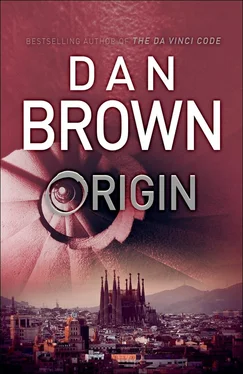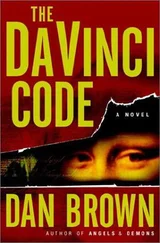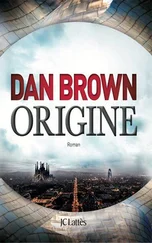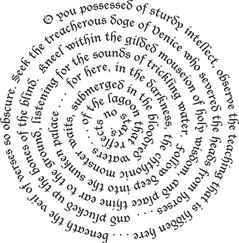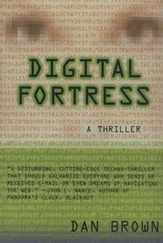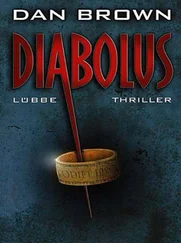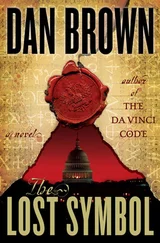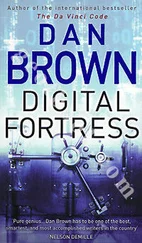The screen now flashed a faded New York Times article from March 8, 1953, titled “Looking Back Two Billion Years.”
“Obviously,” Edmond said, “this experiment raised some eyebrows. The implications could have been earth-shattering, especially for the religious world. If life magically appeared inside this test tube, we would know conclusively that the laws of chemistry alone are indeed enough to create life. We would no longer require a supernatural being to reach down from heaven and bestow upon us the spark of Creation. We would understand that life simply happens... as an inevitable by-product of the laws of nature. More importantly, we would have to conclude that because life spontaneously appeared here on earth, it almost certainly did the same thing elsewhere in the cosmos, meaning: man is not unique; man is not at the center of God’s universe; and man is not alone in the universe.”
Edmond exhaled. “However, as many of you may know, the Miller-Urey experiment failed. It produced a few amino acids, but nothing even closely resembling life. The chemists tried repeatedly, using different combinations of ingredients, different heat patterns, but nothing worked. It seemed that life — as the faithful had long believed — required divine intervention. Miller and Urey eventually abandoned their experiments. The religious community breathed a sigh of relief, and the scientific community went back to the drawing board.” He paused, an amused glimmer in his eyes. “That is, until 2007... when there was an unexpected development.”
Edmond now told the tale of how the forgotten Miller-Urey testing vials had been rediscovered in a closet at the University of California in San Diego after Miller’s death. Miller’s students had reanalyzed the samples using far more sensitive contemporary techniques — including liquid chromatography and mass spectrometry — and the results had been startling. Apparently, the original Miller-Urey experiment had produced many more amino acids and complex compounds than Miller had been able to measure at the time. The new analysis of the vials even identified several important nucleobases — the building blocks of RNA, and perhaps eventually... DNA.
“It was an astounding science story,” Edmond concluded, “relegitimizing the notion that perhaps life does simply happen... without divine intervention. It seemed the Miller-Urey experiment had indeed been working, but just needed more time to gestate. Let’s remember one key point: life evolved over billions of years, and these test tubes had been sitting in a closet for just over fifty. If the timeline of this experiment were measured in miles, it was as if our perspective were limited to only the very first inch...”
He let that thought hang in the air.
“Needless to say,” Edmond went on, “there was a sudden resurgence in interest surrounding the idea of creating life in a lab.”
I remember that , Langdon thought. The Harvard biology faculty had thrown a department party they billed as BYOB: Build Your Own Bacterium.
“There was, of course, a strong reaction from modern religious leaders,” Edmond said, placing air quotes around the word “modern.”
The wall display refreshed to the homepage of a website — creation.com — which Langdon recognized as a recurring target of Edmond’s wrath and ridicule. The organization was indeed strident in its Creationist evangelizing, but it was hardly a fair example of “the modern religious world.”
Their mission statement read: “To proclaim the truth and authority of the Bible, and to affirm its reliability — in particular its Genesis history.”
“This site,” Edmond said, “is popular, influential, and it contains literally dozens of blogs about the dangers of revisiting Miller-Urey’s work. Fortunately for the folks at creation.com, they have nothing to fear. Even if this experiment succeeds in producing life, it probably won’t happen for another two billion years.”
Edmond again held up the test tube. “As you can imagine, I would like nothing more than to fast-forward two billion years, reexamine this test tube, and prove all the Creationists wrong. Unfortunately, accomplishing that would require a time machine.” Edmond paused with a wry expression. “And so... I built one.”
Langdon glanced over at Ambra, who had barely moved since the presentation started. Her dark eyes were transfixed by the screen.
“A time machine,” Edmond said, “is not that difficult to build. Let me show you what I mean.”
A deserted barroom appeared, and Edmond walked into it, moving to a pool table. The balls were racked in their usual triangular pattern, waiting to be broken. Edmond took a pool cue, bent over the table, and firmly struck the cue ball. It raced toward the waiting rack of balls.
An instant before it collided with the rack, Edmond shouted, “Stop!” The cue ball froze in place — magically pausing a moment before impact.
“Right now,” Edmond said, eyeing the frozen moment on the table, “if I asked you to predict which balls would fall into which pockets, could you do it? Of course not. There are literally thousands of possible breaks. But what if you had a time machine and could fast-forward fifteen seconds into the future, observe what happens with the pool balls, and then return? Believe it or not, my friends, we now have the technology to do that.”
Edmond motioned to a series of tiny cameras on the edges of the table. “Using optical sensors to measure the cue ball’s velocity, rotation, direction, and spin axis as it moves, I can obtain a mathematical snapshot of the ball’s motion at any given instant. With that snapshot, I can make extremely accurate predictions about its future motion.”
Langdon recalled using a golf simulator once that employed similar technology to predict with depressing accuracy his tendency to slice golf shots into the woods.
Edmond now pulled out a large smartphone. On the screen was the image of the pool table with its virtual cue ball frozen in place. A series of mathematical equations hung over the cue ball.
“Knowing the cue ball’s exact mass, position, and velocity,” Edmond said, “I can compute its interactions with the other balls and predict the outcome.” He touched the screen, and the simulated cue ball sprang to life, smashing into the waiting rack of balls, scattering them, and sinking four balls in four different pockets.
“Four balls,” Edmond said, eyeing the phone. “Pretty good shot.” He glanced up at the audience. “Don’t believe me?”
He snapped his fingers over the real pool table, and the cue ball released, streaking across the table, loudly smacking into the other balls, and sending them scattering. The same four balls fell in the same four pockets.
“Not quite a time machine,” Edmond said with a grin, “but it does enable us to see the future. In addition, it lets me modify the laws of physics. For example, I can remove friction so that the balls will never slow down... rolling forever until every last ball eventually falls into a pocket.”
He typed a few keys and launched the simulation again. This time, after the break, the ricocheting balls never slowed down, bouncing wildly around the table, eventually falling into pockets at random, until there were only two balls left careening around the table.
“And if I get tired of waiting for these last two balls to drop,” Edmond said, “I can just fast-forward the process.” He touched the screen, and the two remaining balls accelerated in a blur, streaking around the table until they finally fell into pockets. “This way I can see the future, long before it happens. Computer simulations are really just virtual time machines.” He paused. “Of course, this is all fairly simple math in a small, closed system like a pool table. But what about a more complex system?”
Читать дальше
